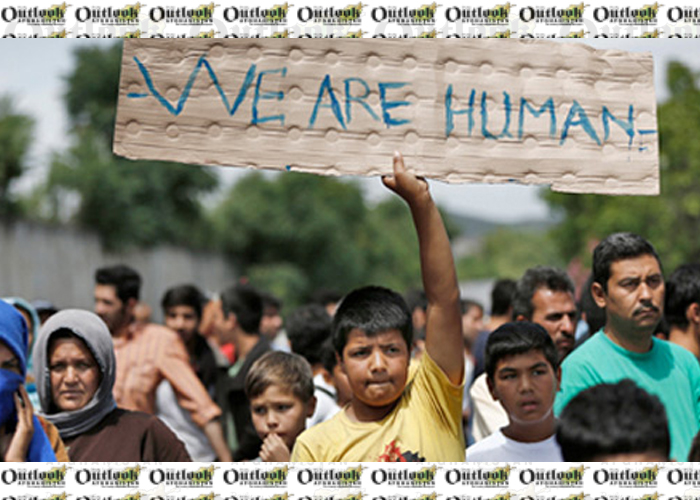In the Geneva Conference on Afghanistan last month, the eradication of corruption and the safeguarding of human rights were two essential guarantees which the international community sought before confirming their financial assistance to Afghanistan. Sadly, Afghanistan has not performed very well on both the matters and there are no clear indications on how the authorities in the country plan to tackle these important matters. Though on many occasions, the governments in Afghanistan have promised to consider the issues, no tangible measures have been observed as millions of people suffer because of them. Human rights, in particular, remain vulnerable in the country, with the most vulnerable people being the softest targets of severe violations.
Almost every other day, there are pieces of news from different parts of the country that show vehement human rights abuses; they are in addition to many other cases that are never reported. As a response to such a tragic situation, the Afghan authorities have been able to offer only a lip service.
Even before the Geneva Conference, the international organizations requested the donor countries to set tough conditions for the Afghan government so that it can ensure better measures.
Head of South Asia at Amnesty International, Omar Waraich, in one of such requests said, “Afghanistan is at a critical moment. Even as there is talk of peace, violence continues to surge, claiming hundreds of civilian lives, the protection of human rights is nowhere on the political agenda, and COVID-19 continues to run rampant in a country with one of the weakest health systems in the world. Now is not the time for international donors to be scaling down or stepping back.” It clearly alarmed the donor regarding the incidents of human rights violation in Afghanistan and the unpreparedness of the political leadership to take decisive steps against them. It also urged the Afghan government to
‘demonstrate its ongoing commitment to defending human rights, safeguarding freedom of expression, and protecting minority groups’.
Human Rights Watch (HRW) also expressed concerns about the situation of human rights in Afghanistan before the Geneva Conference, emphasizing that the foreign donors should prioritize funding for education and health, especially for girls and women, and for independent media. Patricia Gossman, the associate Asia director at HRW, emphasized: “The Geneva Conference is a crucial opportunity to protect gains in human rights that have allowed ordinary Afghans, in particular women and girls, to enjoy greater freedoms and better education and health … Talks toward ending the conflict don’t make this the time for donors to reduce funding for Afghanistan’s most vulnerable communities. Afghanistan’s future – hopefully a peaceful and rights-respecting one – depends on having an educated and healthy population.” Though the director hinted to continue the support for human rights in Afghanistan, she also highlighted the major issues being faced by the suffering Afghan civilians. HRW also emphasized that donors should press the Afghan government and Taliban to end abuses by their security forces, including deliberate or indiscriminate attacks on schools that violate the laws of war. Military use of schools by both sides contravenes the Safe Schools Declaration, which Afghanistan endorsed in May 2015. Such actions have contributed to insecurity and civilian loss of life, driving countless children – mostly girls – out of school.
Having such a prevalent scenario of human rights violation, it is unfortunate to find an insufficient justice system in the country. Amnesty International also highlighted the drawbacks in Afghanistan’s justice system that has not been able to protect the rights of Afghan civilians properly: “Despite the millions spent on improving access to justice for people in Afghanistan, the judiciary and legal system remains weak and unresponsive. Afghans face delays, intimidation and corruption when accessing formal justice mechanisms while the implementation of the law is patchy at best, with perpetrators frequently going unpunished and their crimes uninvestigated.” Thus, there is a crying need to improve the justice system so that the people do not remain deprived of their basic needs which the state and government have promised to provide them.
The best way for Afghanistan to ensure the fundamental human rights of its people is through the United Nations Charter and Universal Declaration of Human Rights (UDHR). Article 1 of the UDHR states that with respect to dignity and rights all human beings are born free and equal. Meanwhile, the UN Charter provides very strong commitments to the preservation of human rights and emphasizes that the member countries must follow them. The preamble of the charter reaffirms faith in fundamental human rights, in the equal rights of men and women, while the Article 1(3) of the charter says that one of the basic purposes of UN is “to achieve international cooperation in solving international problems of economic, social, cultural or humanitarian character, and in promoting and encouraging respect for human rights and for fundamental freedoms for all without distinction of race, sex, language or religion.” Most importantly, Article 56 of the charter says, “All members pledge themselves to take joint and separate action in cooperation with the Organization for the achievement of the purposes set forth in Article 55, which suggests for ‘(a) higher standards of living, full employment, and conditions of economic and social progress and development; b) solutions of international economic, social, health, and related problems; c) international cultural and educational cooperation; d) universal respect for, and observance of, human rights and fundamental freedoms for all without distinction as to race, sex, language, or religion’.”
Home » Opinion » Concerns About Human Rights Violations in Afghanistan
Concerns About Human Rights Violations in Afghanistan
| Sajjad Aasim

